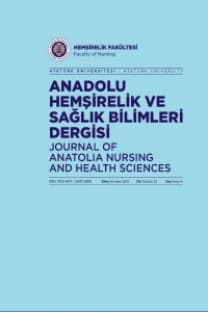ÖĞRENCİLERİN RUH SAĞLIĞI VE HASTALIKLARI HEMŞİRELİĞİ DERSİNİN KLİNİK UYGULAMASINA İLİŞKİN YETERLİLİK ALGILARI
___
- Al-Zayyat A.S., Al Gamal E. Perceive Distress And Coping Strategies Among Jordanian Nursing Students During Clinical Practice In Psychiatric/Mental Health Courses. International Journal Of Mental Health Nursing 2014;23: 326-35.
- Arnold S.A., Deans C.,Munday J. University And Service Sector Collaboration For Undergraduate Psychiatric Nursing Education. International Journal of Mental Health Nursing 2004; 13: 61-6.
- Binding LL., Randall J. Anxiety As A Barrier To Student Performance. Can Nurse. 2004; 100(6):7.
- Bondy, K., Jenkins, K., Seymour, L., Lancaster, R., & Ishee, J. The development and testing of competency-focused psychiatric nursing clinical evaluation instrument. Archives of Psychiatric Nursing 1997; 11(2), 66-73.
- Botma Y. Nursing Student's Perceptions On How Immersive Simulation Promotes Theory-Practice Integration. International Journal of Africa Nursing Sciences 2014; 1: 1-5.
- Brown J.F. Applications Of Simulation Technology In Psychiatric Mental Health Nursing Education. Journal Of Psychiatric And Mental Health Nursing 2008; 15: 638-44.
- Brown A.M. Simulation In Undergraduate Mental Health Nursing Education: A Literature Review. Clinical Simulation in Nursing 2015;11: 445-9.
- Burnstein C. Recalling Sources Of Student Anxiety. Nurse Educator 1998; 23 (1): 11-19.
- Carpenter S.H.J.S. Qualitative Research In Nursing, Third Edition. Philadelphia: Lippincott; 2003. p.31- 32.
- Charleston R., Happell B. Preceptorship In Psychiatric Nursing: An Impact Evaluation From An Australian Perspective. NurseEducation in Practice 2005; 5: 129-35.
- Dil S., Aykanat B. Ruh Sağlığı ve Hastalıkları Hemşireliği Dersinin Hemşirelik Öğrencilerinin Duygusal Durumlara Yaklaşma ve Kaçınma Motivasyon Düzeylerine Etkisi. Psikiyatri Hemşireliği Dergisi 2013;4(3):125-130
- Echternacht M, Youngs R. Clinical Supervision: Instructional Strategy In The Development Of psychiatric Nursing Skills.Teaching And Learning In Nursing 2008; 3: 76-80.
- Ewashen C, Lane A. Pedagogy, Power And Practice Ethics:Clinical Teaching in Psychiatric/Mental Health Settings. Nursing Inquiry 2007; 14(3): 255-62.
- Happell B. When I Grow Up I Want To Be a...? Where Undergraduate Student Nurses Want To Work After Graduation. Journal Of Advanced Nursing 1999; 29(2): 499-505.
- Happell B, Rushworth L. Can Educational Methods Influence The Popularity Of Psychiatric Nursing? Nurse Education Today 2000; 20: 318-26.
- Hesse-Biber S, Leavy P. The Practice Of Qualitative Research California: Sage Publications, 2006.
- Higginsa A, McCarthy M. Psychiatric Nursing Students' Experiences Of Having a Mentor During Their First Practice Placement: An Irish Perspective, Nurse Education in Practice 2005; 5: 218-24.
- Hung B.J., Huang X.Y., Lin M.J. The First Experiences Of Clinical Practice Of Psychiatric Nursing Students In Taiwan: A Phenomenological Study, Journal of Clinical Nursing 2009; 18: 3126-35. Karımollahı M. An Investigation Of Nursing Students' Experiences In an Iranian Psychiatric Unit, Journal Of Psychiatric and Mental Health Nursing 2012; 19: 738-45.
- Kleehammer, K., Hart, L. A., Keck, F. J. Nursing Students' Perceptions Of Anxiety-Producing Situations in The Clinical Setting. Journal of Nursing Education 1990; 29, 183-87.
- Ketola J, Stein J.V. Psychiatric Clinical Course Strengthens The Student-Patient Relationships Of Baccalaureate Nursing Students. Journal Of Psychiatric And Mental Health Nursing 2013; 20:23- 34.
- Kragelund L. Student Nurses' Learning Processes In Interaction With Psychiatric Patients:Aqualitative Investigation. Nurse Education In Practice 2011;11: 260-7.
- Melrose S, Shapiro B. Students' Perceptions Of Their Psychiatric Mental Health Clinical Nursing Experience: A Personal Construct Theory Exploration. Journal of Advanced Nursing 1999; 30(6): 1451-8.
- Nolan G, Ryan D. Experience Of Stress In Psychiatric Nursing Students In Ireland Nursing Standard 2008; 22( 43): 35-43.
- Özbaş D., Buzlu S. Hemşirelik Öğrencilerinin Psikiyatri Hemşireliği Dersine ve Psikiyatri Hemşiresinin Rollerine İlişkin Düşünceleri. Anadolu Hemşirelik ve Sağlık Bilimleri Dergisi 2011; 14(1): 31-40.
- Penn T.D. Enhancing Student Comfort In Psychiatric Clinical Settings.Teaching And Learning In Nursing 2008; 3: 53-5.
- Prebble K. On the brink of change? Implications Of The Review Of Undergraduate Education In New Zealand For Mental Health Nursing. Australian and New Zealand Journal of Mental Health Nursing 2001; 10: 136-14.
- Ross C, Mahal K, ChinnapenY, Kolar M, Woodman K. Evaluation Of Nursing Students' Work Experience Through The Use Of Reflective Journals. Art & Science Pre-registration Education 2014; 17 (6): 21-7.
- Saarikoski M, Leino-Kilpi H. Association Between Quality Of Ward Nursing Care And Students' Assessment Of The Ward As a Clinical Learning Environment. Nursing Times Research 1999; 4: 467- 74.
- Smith G.R., Bradley P.K., Meakim C. Evaluating The Use Of Standardized Patients In Undergraduate Psychiatric Nursing Experiences. Clinical Simulation i,In Nursing 2009; 5: 203-11
- Song E. The Nursing Students' Experience Of Psychiatricpractice In Southkorea. Archives Of Psychiatric Nursing 2015; 29: 355-60.
- Surgenor L.J., Dunn J, Horn J. Nursing Student Attitudes To Psychiatric Nursing And Psychiatric Disorders In New Zealand, International Journal Of Mental Health Nursing 2005;14,:103-8.
- Tully A. Stress, Sources Of Stress And Ways Of Coping Among Psychiatric Nursing Students. J Psychiatr Ment Health Nurs. 2004; 11(1):43-7.
- Oermann M.H., Sperling S.L. Stress And Challenge Of Psychiatric Nursing Clinical Experiences Archives Of Psychiatric Nursing 1999;13( 2):74-9.
- Webster D. Using Standardized Patients To Teach Therapeutic Communication In Psychiatric Nursing. Clinical Simulation In Nursing 2014; 10: 81-6.
- White K.H., Happell B. Nursing Students' Attitudes Toward Mental Health Nursing And Consumers: Psychometric Properties Of a Self-Report Scale. Archives Of Psychiatric Nursing 2005; 19(4) :184-93.
- Yıldırım A, Şimşek H. Sosyal Bilimlerde Nitel Araştırma Yöntemleri. Genişletilmiş 5. Baskı. Ankara: Seçkin Yayıncılık; 2005. p.187-273.
- ISSN: 1309-5471
- Yayın Aralığı: 4
- Yayıncı: Atatürk Üniversitesi Hemşirelik Fakültesi
Hatice ÖNER ALTIOK, Mehtap KIZILKAYA
NÖROŞİRÜRJİ HASTALARININ AMELİYAT ÖNCESİ ANKSİYETE DÜZEYLERİ
Sevban ARSLAN, Seçil TAYLAN, Sevgi DENİZ
YENİDOĞAN GÖBEK BAKIMINDA KLORHEKSİDİN, İYOT VE ALKOLÜN KARŞILAŞTIRILMASI
Refika GENÇ KOYUCU, Yıldız TOSUN, Fadime ÇINAR
KAHKAHA TERAPİSİ VE SAĞLIK ALANINDA KULLANIM ÖRNEKLERİ
Özlem KARDAŞ KİN, Yasemin YILDIRIM
OPINIONS OF HEALTH CARE PROFESSIONALS REGARDING NURSING PROFESSION
Sultan AYAZ ALKAYA, Şengül YAMAN
PSYCHOSOCIAL ADJUSTMENT IN HEART FAILURE PATIENTS WITH CARDIOVERTER DEFIBRILLATOR IMPLANTATION
Arnel BÖKE KILIÇLI, Leyla ÖZDEMİR
Emine Şireci, Elanur Yılmaz Karabulutlu
SAĞLIK EYLEM SÜRECİ YAKLAŞIMI MODELİ
ÇOCUK KLİNİKLERİNDE ÇALIŞAN HEMŞİRELERİN TIBBİ HATA YAPMA EĞİLİMLERİNİN İNCELENMESİ
